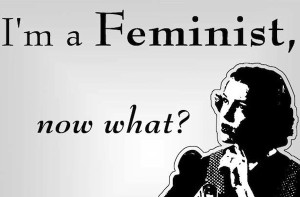Before embarking on Yeats’s “A Prayer for my Daughter,” I originally thought it sweet that Yeats felt an urge to “dedicate” a poem to his daughter. After further reading, I realize the morphed perspective Yeats seems to take—not only in terms of his daughter, but in his assumed perception of Irish womanhood. While the piece begins with the juxtaposition of a violent, “howling” storm contrasted with his peaceful, sleeping daughter, the reader soon awakens to a higher degree of critical awareness that is unsettling to any feminist critic.
In stanza four, Yeats calls to mind “that great queen that rose out of the spray” (Aphrodite, most likely) and “Helen [who] found life flat and dull,” (Helen, who is often painted as the “indirect cause of the Trojan war”). In doing so, he seems to attempt to warp the narrative of female mythology to embody an over-all sense of disruption and folly. Embedded in Yeats’s fourth stanza seems to be the implication that throughout history (and suggestively, in the life of Yeats himself) women only contribute the façade of alluring beauty that inevitably leads to misfortune (here we go again with resentment toward Maud Gonne).
In this vein, it seems to me that Yeats’s “A Prayer for my Daughter” is code for “I wish I had a son Instead.” Am I taking this too far? Had I been the daughter of Yeats, I would be disheartened to read that my opinionated, impassioned father wished me to believe that “opinions are accursed.” In other words, Yeats does not believe that his daughter is capable of generating opinions worthy of contemplation or engagement??? This line of thought leads me to pose a question: would Yeats have written the same poem had his child been male? I’m not convinced.
Taking my argument further is the notion of traditional Irish womanhood—the current by which Yeats seemingly supports (and even encourages) woman’s quiet, grey role in the Irish home. For example, the poem’s last stanza: “may her bridegroom bring her to a house/ Where all’s accustomed.” One faulty element to these lines is the presupposed identity that Yeats projects onto his infant daughter: she will be attracted to a man, will marry said man, will make an “accustomed” and “ceremonious” home with this man, her “bridegroom”… These lines also seem to uphold the notion that women cannot successfully exist in society as independent beings—they need both an “accustomed house” and a “bridegroom” to be admissible in the mouth of societal dogma…
I can see how Yeats’s misfortunate experiences with Maud Gonne could influence his view of women… but it’s no excuse in my eyes. It is my contention that by writing his poem—and overtly assigning it to his own daughter—Yeats dangerously propagates a misogynistic view of women, belittling his own child in the process.


I agree. Yeats wasn’t terribly well-balanced in his views on women at the best of times, but as he passed further into adulthood and middle age he definitely lost touch. However, while I read a similar message from this poem that you have, I found it in different passages. For example, in the 3rd stanza, I see the implications that you read from the last: that Yeats, for all his lionizing of Ireland and anthropomorphization of the country as a woman, doesn’t actually think that much of them. They are passive; they have to be, because if they aren’t they can’t serve as objects and objectives to fight for.
Totally sympathize with the critique, but…. well, two quick things. First, when Yeats references “opinions,” he’s not really talking about what we would normally think of as opinions–like, “I think that studying literature is more important than math,” or “I think Obamacare is great for the U.S.” Rather, he’s talking about rigid, extremist beliefs that, at the time Yeats was writing, could get people killed–a kind of group ideology that is simplistic and unyielding. Second, when he describes her as a “tree,” he’s not really saying “I want women to stay home and do nothing.” Instead, for Yeats, the tree symbolizes a connection with those deeper ties (ceremony, folklore, etc) that bind a community together. That’s why he mentions “radical innocence.” Simple “innocence,” for Yeats, is passive, in the sense that one gives over one’s mind to the rigid group think of the masses (the popular “opinions” of the day). Radical innocence, by contrast, is active–it requires an act of will (e.g., pursuing art at all casts, in the manner of Synge) that allows the individual to connect with the deeper consciousness of the nation. In other words, it’s a paradox: by actively giving expression to the self, the self merges with the collective. All of that’s not to say that we shouldn’t be suspicious of Yeats’s gender politics. They are, even allowing these caveats, more than a little troubling, but I just want to note that the poem is more complicated than it would seem at first glance. Oh, and if you really want to get creeped out, focus on the poem’s whole eugenics undercurrent. Yeats seems to want his daughter to be a fully actualized human being in everything except breeding. On that level, Yeats wants her to be sure to marry the “right” (i.e., aristocratic) guy.